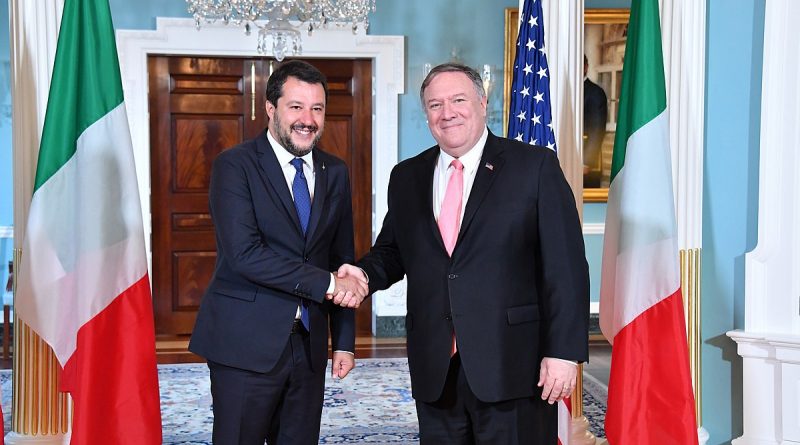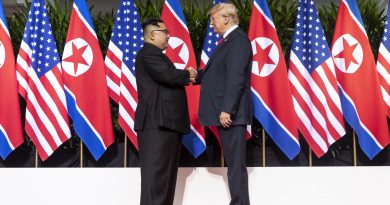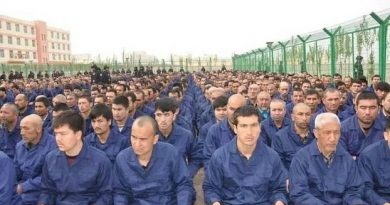Matteo Salvini: Politics of “The Captain”
Jackson Lied
Staff Writer
Matteo Salvini, Italy’s Deputy Prime Minister and Minister of the Interior, is such an influential world character that he can often be difficult to comprehend. As an American, it is easy to be consumed in the flood of news revolving around domestic politics and the Trump administration. One can be quick to dismiss similar news coming from Europe as less significant.
Pertaining to populism and anti-immigration rhetoric, President Trump and the United States may appear to hold a media monopoly. However, the owner of that title should go to Matteo Salvini. The successful wave of populism, nationalism, and anti-immigration sentiments that Salvini’s cohort sparked throughout Italy, and all of Europe consequentially, rivals even that of President Trump.
TIME reports that Salvini will do anything to establish a “proper defense” of the Italian people. His name continues to appear in global media as the bulwark against illegal immigration. This news has followed him through the eventful time since his rise to power. He has turned away migrant ship after migrant ship, sometimes resulting in deadly consequences for people searching for a haven from war or catastrophe.
Moreover, his conservative ideas do not stop at immigration policy, but have also penetrated the economic and social spheres of Italy and Europe. In the future of Italian and Eurozone politics, Salvini’s influence will not fade without a fight.
On June 29, The New York Times reported that the Italian government refused to accept a ship of Libyan refugees. Mr. Salvini has insisted that his country’s ports are closed to such vessels. The Dutch rescue ship, the Sea Watch 3, finally reached the dock and released its tired passengers onto safer land, but not without incident.
Carola Rackete, the captain of Sea Watch 3, was arrested for resisting a war ship as she brought the boat into port. After an Italian patrol ship was sent to stop the Sea Watch 3 from docking, Captain Rackete rammed into the patrol boat in a final effort to bring the migrants ashore.
According to the New York Times, Salvini addressed the action as an “act of war.” Speaking with media after the event, he stated that Rackette acted recklessly and put innocent border agents’ lives at risk when they were just doing their jobs.
One of Salvini’s other complaints was that the government of the Netherlands did not step in, as the Sea Watch 3 was Dutch in origin. However, critics were quick to point out that Sea Watch is a recognized non-governmental organization.
Salvini has also called for European countries like Finland, France, Germany, and Portugal to take in additional ships. Salvini said that his immigration policies have “served to wake up Europe and to wake up these countries.”
In addition to Salvini’s stance on immigration, he has a complicated relationship with the Catholic Church and Pope Francis in particular. Commenting after Salivini’s nationalistic election victory, Pope Francis said that some politicians had made people “intolerant, closed and perhaps even, without realizing it, racist.” His statement serves as a testament to Salvini’s impact on a positive “European ethic.”
Recently, Salvini has aligned himself with Cardinal Raymond Leo Burke, a conservative American bishop at odds with Pope Francis. According to an additional report, Mr. Salvini has also thrown in his support for the current Pope’s predecessors, often implying that he still sees Benedict XVI as his Pope.
Salvini has sowed conflict between the church and Italy. He uses Catholic imagery to promote his political success while simultaneously exacerbating the issue of migrants dying in the Mediterranean, an issue that Pope Francis is keen on fixing.
Another item relative to Salvini’s policies is “mini-BOTs.” According to the Financial Times, mini-BOTs are a bond currency that would run parallel to the euro in Italy. This currency was recently approved by the Italian parliament. Salvini supports mini-BOTs, but experts are not sure what his motives are because it is unclear what effect they will have on Italy’s relationship with the Eurozone.
Italy’s rising debt is a problem for Europe, and some countries are beginning to take precautionary steps to handle it. Mini-BOTs could theoretically prevent the debt issue, but they would also compete with the euro and thereby weaken the Italy-Eurozone relationship. A nationalist like Salvini could separate Italy from the Eurozone.
Constantly promoting a xenophobic image, Matteo Salvini has wielded power to attract Italians to his anti-immigration point of view on other occasions:
The Guardian reported in August of 2018 on another situation between Salvini and a refugee ship. This time, Salvini nearly ended up in jail instead of the ship’s captain.
The Ubaldo Diciotti docked with 177 migrants on board, and by Salvini’s demand, no one was allowed ashore. Eventually, some children and the sick were let off, but 134 persons remained. This led Italian prosecutors to open an investigation of Salvini for “possible illegal detention and kidnapping.”
It is also possible that Italy was in violation of the European Convention on Human Rights, which does not allow asylum seekers to be held for longer than forty-eight hours. Salvini was never indicted; he released all the migrants as soon as the investigation was announced, and no consequences were ever seen.
Elsewhere, Salvini handles journalistic criticism questionably. The Guardian published an additional report on Roberto Saviano, a writer being charged with libel against the Deputy Prime Minister.
Saviano, an avid anti-mafia journalist, was quoted regarding his charges: “I face trial for my opinions. It’s a form of extortion by Salvini, making a legal target of his critics. Salvini delivers a clear message to anyone who wants to oppose him or investigate political connections to the mafia. I am the means by which he can communicate his intentions towards everyone else.”
Saviano and Salvini have gone back and forth with one another about the latter’s hardline immigration policy. Saviano also accused La Lega, Salvini’s right wing political party, of having connections to the Mafia.
Critics of Salvini have described his suppression of Saviano as suspicious at best. The willingness to oppress political opposition represents a desire for more authoritarian role, something the Italian people are naturally uncomfortable with given their history with fascism.
When Salvini rose to his current position in the Italian government, Al Jazeera published an article on his political agendas and history, topics that receive little media attention.
Salvini’s political career began when he joined the Northern League party in 1990. Three years later, he held his first and only political seat as a councillor in Milan. From there, he became head of the Northern League’s radio station, where he learned how to manipulate Italian public opinion for better or worse.
Most interesting about Salvini’s political history was his peculiar ideology switch in 2013. Originally touting himself as a leftist, he even attempted to form a communist wing of the Northern League. At some point, and seemingly without reason, he morphed into the right-wing conservative he is known as today.
Then, after assuming control of the Northern League in 2013, Salvini changed the party’s name to simply the League, or “La Lega.” That is, he abandoned the secessionist ideas that the Northern League had adamantly stood for. As its name implied, the Northern League pushed for Northern Italy to separate from the rest of the country. Many of Salvini’s colleagues and constituents were left frustrated as his opinions and beliefs twisted and turned from the party’s status quo.
Many Italian political pundits frame Salvini as an opportunist. His expedient mindset causes them to wonder if he serves as a cause, or effect, of Europe’s rising populism.
No matter his motives or the benevolence of his beliefs, Salvini’s influence is especially large for the short time period he has held office. His views will inspire others to take similar actions in neighboring states, and his domestic influence will continue to grow, especially considering La Lega’s stature in the most recent election.
Anti-immigration policies at the cost of migrants’ lives, manipulation of the news and church, and a powerful charismatic tone are traits that the world can expect from Matteo Salvini. As has been shouted by crowds of his supporters,“Sta arrivando il capitano!” The captain is coming.



